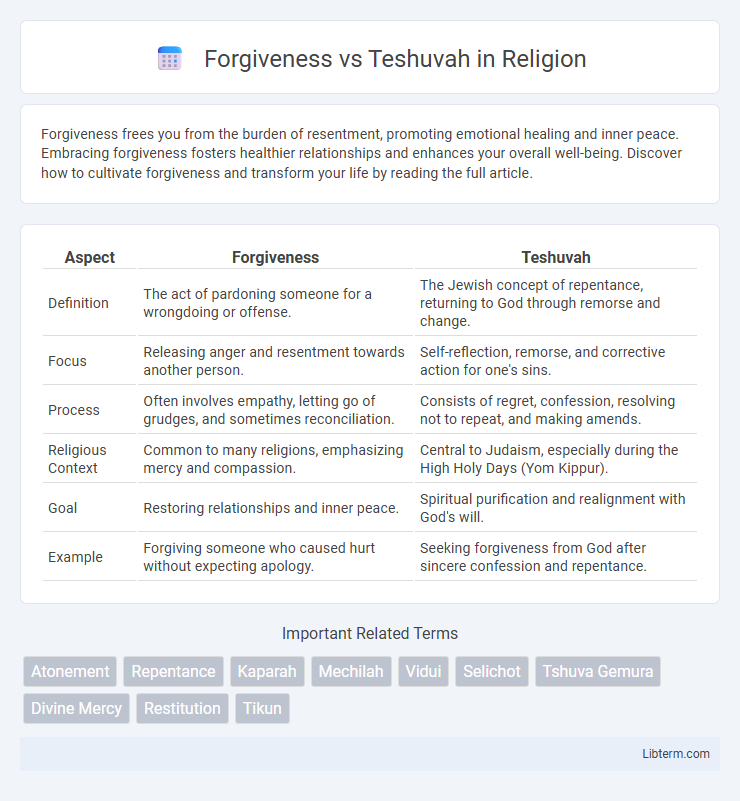Forgiveness frees you from the burden of resentment, promoting emotional healing and inner peace. Embracing forgiveness fosters healthier relationships and enhances your overall well-being. Discover how to cultivate forgiveness and transform your life by reading the full article.
Table of Comparison
| Aspect | Forgiveness | Teshuvah |
|---|---|---|
| Definition | The act of pardoning someone for a wrongdoing or offense. | The Jewish concept of repentance, returning to God through remorse and change. |
| Focus | Releasing anger and resentment towards another person. | Self-reflection, remorse, and corrective action for one's sins. |
| Process | Often involves empathy, letting go of grudges, and sometimes reconciliation. | Consists of regret, confession, resolving not to repeat, and making amends. |
| Religious Context | Common to many religions, emphasizing mercy and compassion. | Central to Judaism, especially during the High Holy Days (Yom Kippur). |
| Goal | Restoring relationships and inner peace. | Spiritual purification and realignment with God's will. |
| Example | Forgiving someone who caused hurt without expecting apology. | Seeking forgiveness from God after sincere confession and repentance. |
Understanding Forgiveness: A Universal Concept
Forgiveness is a universal concept involving the release of resentment and the restoration of harmony between individuals, transcending cultural and religious boundaries. It promotes emotional healing and the rebuilding of trust by allowing both parties to move beyond past wrongs. Teshuvah, a uniquely Jewish practice, complements forgiveness by emphasizing sincere repentance and moral transformation to reconcile with oneself, others, and the Divine.
Defining Teshuvah: The Jewish Approach to Repentance
Teshuvah in Judaism denotes a profound process of repentance focused on sincere remorse, confession, and commitment to change, distinguishing it from general forgiveness which may not require active self-reflection. This concept emphasizes personal responsibility and transformation, enabling individuals to restore their relationship with God and others through intentional actions and spiritual growth. Unlike forgiveness that can be granted by others, teshuvah is an internally driven return to ethical and moral integrity, highlighting the dynamic nature of repentance in Jewish theology.
Key Differences Between Forgiveness and Teshuvah
Forgiveness involves granting pardon for a wrongdoing, often requiring an apology and the restoration of trust, primarily focusing on the relationship between the offender and the offended. Teshuvah, a Hebrew term meaning repentance, encompasses a deeper spiritual process of sincere remorse, self-examination, and commitment to change, aiming to rectify personal behavior and mend the relationship with God. Unlike forgiveness, which is granted by another party, teshuvah is an internal, proactive act emphasizing moral transformation and returning to a path of righteousness.
The Role of Personal Accountability in Teshuvah
Teshuvah emphasizes personal accountability as a foundational element where individuals actively acknowledge their mistakes and commit to meaningful change. Unlike general forgiveness, which may be granted by others, teshuvah requires self-reflection and concrete actions to rectify wrongdoings. This process transforms guilt into growth, fostering sincere repentance and ethical improvement.
Forgiveness: Letting Go Versus Reconciliation
Forgiveness involves releasing resentment and emotional burdens without requiring reconciliation or restoring the relationship, focusing on personal healing and inner peace. It allows individuals to move forward by letting go of anger and pain independently from the offender's actions or apologies. In contrast, teshuvah emphasizes active repentance, moral reflection, and repairing the relationship through sincere remorse and restitution.
Spiritual Transformation Through Teshuvah
Teshuvah is a profound process of spiritual transformation in Judaism, emphasizing sincere repentance and returning to a state of purity by acknowledging sins, feeling genuine remorse, and committing to change. Unlike mere forgiveness, which may be granted without fundamental personal change, teshuvah necessitates introspection and active steps toward moral and spiritual renewal, fostering deeper self-awareness and growth. This transformative journey reconnects individuals to their divine essence, promoting lasting inner peace and alignment with higher ethical values.
Emotional Healing in Forgiveness and Teshuvah
Emotional healing in forgiveness involves releasing resentment and pain to restore inner peace and foster empathy, enabling individuals to move beyond past hurts. Teshuvah, rooted in Jewish tradition, emphasizes deep introspection, sincere remorse, and committed behavioral change, facilitating emotional restoration through personal transformation and reconciliation with both oneself and others. Both processes promote emotional well-being but Teshuvah uniquely integrates spiritual accountability and active repentance for sustained healing.
The Process: Steps of Teshuvah Compared to Forgiveness
Teshuvah involves a structured process comprising recognition of wrongdoing, sincere remorse, cessation of the sin, making amends, and resolving not to repeat the offense, which differs from forgiveness that often centers on the pardoning act by the aggrieved party. While forgiveness requires the victim to release resentment and grant pardon, teshuvah is an introspective journey emphasizing personal accountability and spiritual rectification. This process of teshuvah consequently facilitates profound internal transformation beyond mere external reconciliation.
Cultural Perspectives: Forgiveness in World Religions vs Teshuvah
Forgiveness in world religions often emphasizes interpersonal reconciliation and divine mercy, with Christianity highlighting God's grace and Islam focusing on Allah's compassion and human repentance. Teshuvah in Judaism centers on self-reflection, sincere remorse, and active efforts to amend behavior, underscoring a cyclic process of spiritual return and ethical transformation. Cross-cultural perspectives reveal that while forgiveness seeks restoration of relationships, teshuvah prioritizes inward moral correction and a renewed covenant with God.
Forgiveness and Teshuvah in Modern Life
Forgiveness and teshuvah both play crucial roles in modern life by fostering emotional healing and personal growth. Forgiveness involves letting go of resentment towards others, promoting mental well-being and healthier relationships, while teshuvah, the Jewish process of repentance, emphasizes sincere self-reflection and commitment to change to repair one's moral and spiritual standing. Integrating forgiveness and teshuvah into daily practice supports resilience, accountability, and the cultivation of empathy in contemporary social and interpersonal contexts.
Forgiveness Infographic

 libterm.com
libterm.com